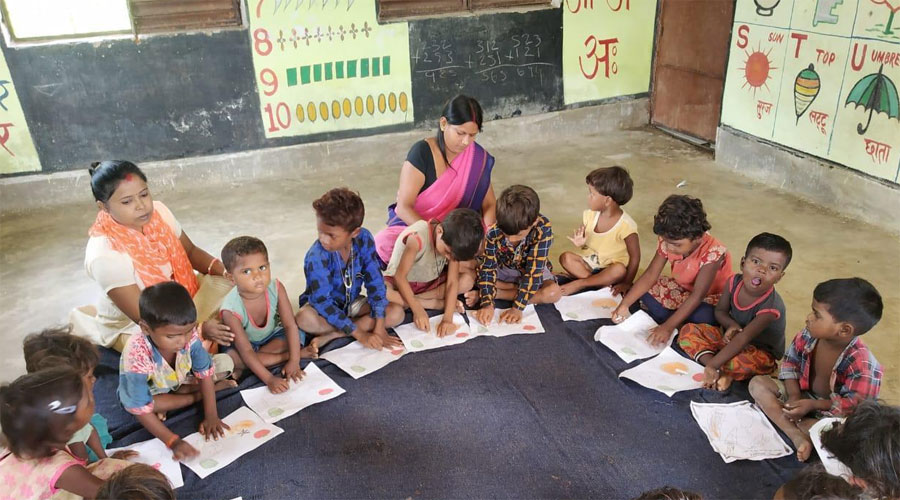The Anil Agarwal Foundation, run by Vedanta, and the Bill and Melinda Gates Foundation have announced a project in partnership with the Centre to upgrade 500 anganwadi centres in Uttar Pradesh, stirring concerns about the fate of the key welfare programme.
Anganwadis provide supplementary nutrition and several health services to children aged 3 to 6 and their mothers apart from informal pre-school education.
The Anil Agarwal Foundation is the philanthropic arm of mining company Vedanta Ltd, which tried to allay the apprehensions that are being fuelled by a perceived lack of transparency. Compounding the perception challenge is the Narendra Modi government’s ham-handed approach towards privatisation in general, which has made it a controversial subject and source of mistrust.
A stated reason for a corporate role is the government’s inability to provide adequate funds for the welfare programme but it is not clear yet how much money the foundations will invest in the upgrade programme.
Vedanta told The Telegraph the upgraded anganwadi centres would continue to be managed by the staff engaged under the Integrated Child Development Scheme (ICDS) of the ministry of women and child development (MoWCD).
“In collaboration with MoWCD, both the foundations have taken up the mantle of modernisation of the anganwadis with state-of-the-art infrastructure and services to the last mile for women and children,” a Vedanta spokesperson said in an email.
Vedanta added: “Both the foundations are jointly working towards building model anganwadis that can be piloted and replicated. The anganwadi centres are upgraded with infrastructure and amenities and continue to be run by the anganwadi staff of ICDS, MoWCD, for creating greater impact in lives of the women and child beneficiaries.”
The spokesperson said the idea was to upgrade the anganwadis to the level of the Nand Ghars --- child care centres run by Vedanta as a corporate social responsibility. The Vedanta website says it has opened 1,700 Nand Ghars across the country since 2015.
“These anganwadis are being developed as per the MoU between Nand Ghar and MoWCD. The idea behind Nand Ghars is to develop modernised anganwadis that be used as a model for replication across all anganwadis by the Govt,” the email said.
“Global philanthropic institutions like BMGF (Bill and Melinda Gates Foundation) have also offered a helping hand to this initiative. Niti Aayog is doing a study on how the model can be replicated and integrated across the country.”
The Left parties have described the initiative as a move towards privatisation of the anganwadi centres.
“And now, Modi government pushed privatisation of anganwadis after handing over food grains procurement to his corporate friends,” the CPM tweeted on Tuesday.
The CPI said the partnership was part of a government plan to reduce funds for public welfare schemes and gradually withdraw from them.
“The ICDS scheme provides nutrition and early childhood education and care to crores of poor children. Its facilities may not be great but it is running,” A.R. Sindhu, general secretary of CPM labour arm Citu, said.
“There is scope for improvement. But by involving the private companies, the government wants to wash off its role. Ultimately, the welfare scheme will suffer.”
Amarjeet Kaur of CPI workers’ wing Aituc said the government was underfunding the ICDS.
“The government is preparing the ground for privatisation. As of now, it’s unable to give adequate funding. So, many anganwadi centres have a dearth of facilities,” she said.
“After sometime, the government will say the Nand Ghar model is doing well and all the government facilities are redundant. They will close the anganwadis.”
Kaur referred to the recently approved National Education Policy (NEP), which recommends the creation of school complexes that would absorb the anganwadis.
India’s 13.79 lakh anganwadi centres, mostly set up in the rural areas, now operate independently, away from primary schools. The NEP says that spending on teachers and resources for small, one-off schools has become economically unviable.
It suggests “the establishment of a grouping structure called the school complex, consisting of one secondary school together with all other schools offering lower grades in its neighbourhood including anganwadis, in a radius of 5 to 10km”.
Apart from such an arrangement increasing the distance between homes and the anganwadis (and primary schools), activists and Left parties fear the government will hand over the new anganwadis at the complexes to private parties.
Ashok Rao, a social activist associated with the NGO Swami Sivananda Memorial Institute that supplies food to anganwadi centres in Delhi, opposed the closure or privatisation of anganwadi centres.
He said the private sector can be brought in only to help train anganwadi staff or enhance the infrastructure at these centres.
A parliamentary standing committee has highlighted the poor funding for women and children’s welfare.
Its report on the women and child development ministry’s demand for grants for 2020-21 says the overall allocation for the ministry has remained unchanged at around one per cent of the budget for the past five years although women and children make up 67.7 per cent of the population. It calls this “a cause of serious concern and introspection”.
In Uttar Pradesh, 1.88 lakh anganwadis out of a sanctioned 1.9 lakh are operating. Some sanctioned centres are inoperative in a few other states too.
The parliamentary committee has recommended that the ministry take the matter up with the states and try and remove any bottlenecks. It has stressed the need to have more anganwadi centres in urban areas.
An email sent to the woman and child development ministry on Wednesday has remained unanswered.











